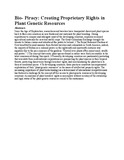| dc.description.abstract | Since the Age of Exploration, researchers and travellers have transported discovered plant species back to their own countries as new foods and raw materials for plant breeding. During expeditions to conquer and subjugate most of the developing countries, explorers screened agricultural materials for new and useful crops. The Great Columbian Exchange brought the tomato to Italian cuisine and introduced the potato to Ireland. 1 The Royal Botanical Gardens at Kew benefited beyond measure from British travellers and colonialists in South America; indeed, the majesty of Britain as a colonial power in the eighteenth and nineteenth centuries was arguably due to the pre-eminence of the gardens. "Control over plants often meant much wealth and power." 2 The concept that exotic plant species found in nature were freely accessible to the taker commenced during this epoch. 3
Presently, developing countries are passionately protesting that scientists from multinational corporations are prospecting for plant species in their tropical forests, protecting discoveries through breeders' rights, and merchandising the plants back to them at exorbitant prices. 4 To developing countries, these practices constitute uncompensated exploitation of their "plant genetic resources" in the name of intellectual property rights. The increasing importance of plant biotechnology as a determinant of international competitiveness has fostered a challenge to the
concept of free access to plant genetic resources by developing countries.
An analysis of plant breeders' rights is incomplete without scrutiny of the ownership and legal status of the plant genetic resources crucial to the sustenance ... | en |

